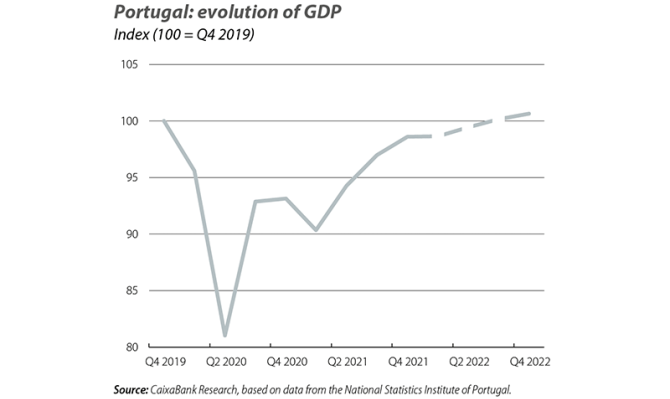Portugal’s GDP growth reached almost 5% in 2021

The first estimate indicates that GDP grew by 1.6% quarter-on-quarter and by 5.8% year-on-year in Q4 2021, bringing growth in 2021 as a whole to 4.9%. The last quarter’s good result will have been supported by the buoyancy of consumption, driven by savings accumulated during the lockdowns and the good performance of exports of goods and tourism services. For 2022, the only information available is that related to the sentiment of economic agents, which shows mixed signals. The industrial and services sectors are more cautious in early 2022, while in the cases of construction and trade, confidence has improved. Similarly, households are more optimistic at the beginning of the year, helping consumption to remain one of the major drivers of growth. Meanwhile, the pandemic appears to be entering a new phase. Although the number of new cases hit successive records in January, the pressure on hospitals is much more moderate than in previous waves of infections, with the level of ICU occupation associated with COVID patients standing at around 15% of the national health system’s capacity. Also, the fatality rate appears to have improved, as although the number of deaths is on the rise, the figure represents just 20% of the level recorded a year ago.

At a time when business surveys in the consumer goods industry are indicating record three-month price expectations, January’s flash indicator for inflation confirmed this trend with a 6-decimal-point rise, bringing it to 3.3%. The energy component continues to apply upward pressure, owing to base effects, the rise in geopolitical tensions surrounding Ukraine, which have been reflected in the price of Brent oil, as well as the fact that the rising energy prices are affecting the final price of other products. 2021 ended with average annual inflation of 1.3%. Since July, the transportation component, which includes fuel for road vehicles, has been showing inflation persistently above 5% (reaching as high as 8.8% in November). However, it was in December that a greater number of components registered inflation above 2%, pushing the overall inflation figure to 2.7%.

The national tourism data available for the end of 2021 confirm a better recovery path than we had projected. Indeed, last year’s overall number of hotel stays reached 54% of the pre-pandemic level (slightly above the 50% predicted by CaixaBank Research). The major driver of the recovery was resident tourists, down just 20% compared to 2019, while in the case of non-residents this gap was still 64%. In fact, in regions such as the Algarve and Madeira, the number of overnight stays by resident tourists already exceeded the levels of 2019.

The budget deficit fell in 2021 to 4.2% of GDP (in cash terms), substantially below the 5.8% registered in 2020 or the government’s latest estimate (4.7%). The deficit in official terms (i.e. in terms of national accounting) may have fallen below 4.0% of GDP, lower than CaixaBank Research’s forecast (–4.3% of GDP). Revenue growth (9.3%) has exceeded expenditure growth (5.2%), a trend favoured by the increased revenues from personal income tax, VAT and social security contributions, in addition to revenues from the 5G auction, European funds and CGD dividends. Expenditure, meanwhile, increased mainly due to the growth in staff costs, current transfers, and the investment in and acquisition of goods and services (including the purchase of vaccines and COVID-19 tests). Overall, COVID-related measures will have amounted to around 2.6% of GDP in 2021, which is more than in 2020 (2.3%). On the other hand, it should be noted that the Socialist Party won the legislative elections on 30 January with an absolute majority, which guarantees a stable outlook for the next four years. The process of drawing up and presenting the 2022 State Budget Proposal (due to enter into force in April or May) is expected to be quick, considering that the proposal previously rejected in October will be presented again, albeit adjusted to take account of the latest economic data.

More specifically, in 2022 the state’s funding needs in order to cover the budget deficit and medium- and long-term debt maturities are estimated at 24.3 billion euros. To meet these needs, the Treasury expects to issue 17.7 billion euros in bonds. The remainder will be funded by short-term debt, European funds and the use of Treasury deposits (13 billion euros). While the funding requirements still exceed those of 2018 and 2019, there are already indications that the consolidation of the public accounts will soon be recovered (having been interrupted during the pandemic). This is a key milestone for building market confidence in a year in which the ECB will begin to withdraw the monetary stimulus. Our estimates suggest that the ECB’s bond purchases in 2022 will be reduced to around 10 billion euros, or about half the level of 2020 and 2021, covering just over 40% of the year’s funding needs (well below the 85% and 90% of 2020 and 2021, respectively, but still above the coverage levels of 2018 and 2019).

In December, the stock of loans increased by 2.9% year-on-year, driven by both companies (2.2% year-on-year) and individuals (3.3% year-on-year). Housing credit was particularly robust, growing by 3.3% year-on-year, due to the strength of new lending transactions (at the time of writing this article, it has been published that new lending up to November increased by 38% year-on-year).
